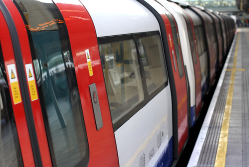Blog posts tagged disconnect
Do we really need Wi-Fi on the Tube?
 News came this week that much-mooted plans for wireless internet access on London’s Underground are going full steam ahead in time for the Olympics.
News came this week that much-mooted plans for wireless internet access on London’s Underground are going full steam ahead in time for the Olympics.
Passengers at over 80 Tube stations will be able to log on while moving through stations and waiting for their trains.
On the face of it, this is A Good Thing. For a start, long-suffering commuters will be pleased they can check the exact reason for the delay on their smart phone or even fire off a complaint to Boris Johnson while stood shoulder-to-shoulder on the platform.
You’ll also be able to email your client if you’re running late for an important meeting with them or grab a map of your destination while on the escalator instead of having to wait till you’re back on the surface. If the connection is good enough, making calls via voice over IP services like Skype could be possible.
On the downside, I’m predicting an increase in the number of accidents on escalators as people check their tweets rather than watching where they’re going. We could even see the odd person attempting to use their full-size laptop on the platform.
(If you think that sounds farfetched, my experience suggests otherwise: I once saw a man playing a game of online poker on his laptop while simultaneously negotiating the ticket barriers and escalators at Reading Station, so anything’s possible.)
When is enough enough?
But as faster internet connections seep into every area of our lives, do we need to start guarding those precious moments when we’re cut off? Should we treasure those increasingly rare minutes when we’re out of signal, offline and unlikely to be disturbed by a buzz in our pocket or someone else’s loud Nokia ringtone? (Watch the video up to the 1:20 mark to make it worthwhile.)
I’m honestly in two minds about this. On the one hand, wireless internet has transformed the way many of us work. Within the office it’s brought extra flexibility to how we conduct meetings and work with colleagues. In the wider world, it’s this technology that enables us to stop for a coffee and catch up on email or get online even when we’re travelling.
But the flipside is that it’s much harder for us to switch off. Queuing in Starbucks? You’re much more likely to check your email or review your tweets than just stopping to look around you.
On the train? Never mind sitting there quietly to collect your thoughts or getting stuck into reading a complex document. With wireless internet available on many UK services, you’re more likely to get distracted by Facebook or spend the time dealing with email overload.
The tables will turn
Currently, losing internet access can be a frustrating experience. But we’re slowly but surely moving towards a world where you can stay connected everywhere.
So, once internet access has crept into every rural blackspot, once every plane has Wi-Fi and once underground trains pose no barrier to getting online (like in Tokyo), will we start to yearn for a place where we can be disconnected? Will the frustration of getting cut-off unexpectedly be replaced by the frustration of being always reachable?
Well, it’s maybe not that clear-cut. But we’re certainly going to have to learn more self-discipline and understand when unplugging ourselves is a good idea: whether it’s to focus on getting a task done or simply to find time and space to think.



